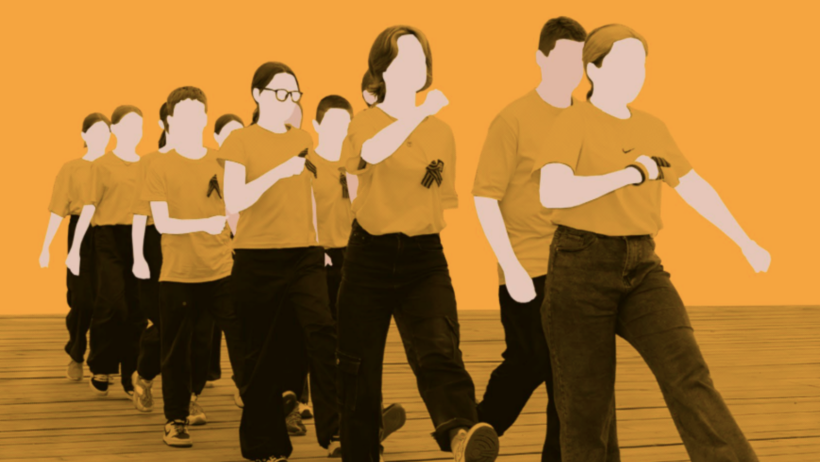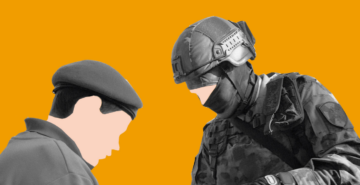

Analytical Report ‘Russian Propaganda Camps’: Where and Why Russia Takes Children from the Temporarily Occupied Territories
Under the guise of ‘rehabilitation and recreation’, one of the main directions of Russian policy towards Ukrainian children from the occupied territories has been their transfer to camps in the Russian Federation or third countries for ‘re-education’. In some cases, this is accompanied by deportation and adoption of minors by Russians. Russian President Vladimir Putin and the Presidential Commissioner for Children’s Rights, Maria Lvova-Belova are personally responsible for the functioning of the mechanism of illegal transfer and deportation of children from the TOT, for whom the International Criminal Court issued arrest warrants in March 2023.
However, even international condemnation and the likelihood of prosecution for war crimes do not deter the RF. Moreover, in 2024, the scale of unlawful transfer of children is increasing, and camp education programmes are overwhelmingly aimed at destroying children’s Ukrainian identity. As a rule, the all-Russian movements ‘Movement of the First’, ‘Youth Army’, and the Russian society ‘Knowledge’ are actively involved in the processes of militarisation, Russification and indoctrination, and Russian holidays are used as a pretext for propaganda activities. Over the summer, there were celebrations of Russia Day, Russian Flag Day, Navy Day, and others.


.
According to the occupation authorities, such number of children were taken to other regions of Russia under the pretext of recreation:
- more than 25,000 children from the TOT of Luhansk region
- more than 13,000 children from the TOT of Donetsk region
- about 3,000 children from the TOT of Kherson region
- more than 6,000 children from the TOT of Zaporizhzhia region
- 174,000 children from the TOT of the AR of Crimea.
Children were provided with so-called recreation, in particular in ‘work and rest’ camps, where almost 4,000 schoolchildren performed daily labour work assigned by the camp management in the morning and until 4 p.m., such as landscaping, volunteering to help the elderly, etc.
Priority groups of children to be granted the recreation in the camps included, in particular:
- children of participants in the so-called SMO,
- orphans and children left without parental care,
- children with disabilities,
- children of those killed in the line of duty,
- children registered with the commissions on juvenile affairs.
All recreation of children from the TOT, including their illegal transfer, is funded from the Russian budget, in particular by the so-called twin cities and and patron regions.
The trips to the camps most often take place within the temporarily occupied territories (taking children to the camps of the TOT of Crimea, Sevastopol, Berdiansk) and the territory of the RF. However, cases of taking children to the territory of Belarus have also been identified. In particular, to the Children’s Rehabilitation and Recreation Centre ‘Forest Glade’, sanatorium ‘Dubrovenka’.
For more information on the policy of taking children to camps in Belarus, see the report ‘Stolen Childhood: How the Belarusian Regime Erases the Identity of Ukrainian Children through Relocation, Reeducation and Militarisation’ prepared by Freedom House, the Regional Centre for Human Rights, the ZMINA Human Rights Centre, Human Rights Center Viasna and the Association of Former Law Enforcement Officers of Belarus (BELPOL).
The location of the established camps to which Ukrainian children from the TOT were taken in the summer of 2024 can be viewed in more detail on the map at https://t1p.de/v1vqw.
By transferring children from the temporarily occupied territories of Ukraine, the Russian Federation grossly violates international law regarding the prohibition on the transfer of children to other states, including transfer within the occupied territories (except for evacuation, if there are legitimate grounds for it):
- Article 78 of Protocol I Additional to the Geneva Conventions of 12 August 1949, and relating to the Protection of Victims of International Armed Conflicts, explicitly prohibits the evacuation of children to a foreign country and specifies the only exceptional circumstance under which the transfer of children in the occupied territory may be permitted – compelling reasons of the health or medical treatment of the children. It is noted that such evacuation should be temporary.
- Article 20 of the International Covenant on Civil and Political Rights, which states that any propaganda for war shall be prohibited by law.
- Article 29 of the Convention on the Rights of the Child, which states that the education of the child shall be directed to the preparation of the child for responsible life in a free society, in the spirit of understanding, peace, tolerance, equality of sexes, and friendship among all peoples, ethnic, national and religious groups and persons of indigenous origin;
- Articles 38 and 39 of the Convention on the Rights of the Child, which regulate the protection of children in times of war.
In addition, the actions of the RF on the displacement of children from the TOT violate other provisions of international humanitarian law and international human rights law. First, Article 49 of the IV Geneva Convention prohibits the forcible transfers of residents of temporarily occupied territories. Secondly, the use of recreation for the actual ‘re-education’ of children violates Articles 8 (the right of the child to preserve his or her identity), 19 (protection of the child from all forms of physical or mental violence, injury or abuse), 31 (the right of the child to rest and leisure) of the Convention on the Rights of the Child, to which the RF is a party.
Read more in the Analytical report.
The monitoring report was prepared by the Centre for Civic Education ‘Almenda’ as part of the project ‘Childhood Unchained: Standing Against Occupation`s Impact’. The project is implemented with the financial support of the Ministry of Foreign Affairs of the Czech Republic as part of the Transition Promotion Programme. The views expressed in this report are those of the authors and do not reflect the official position of the Ministry of Foreign Affairs of the Czech Republic



